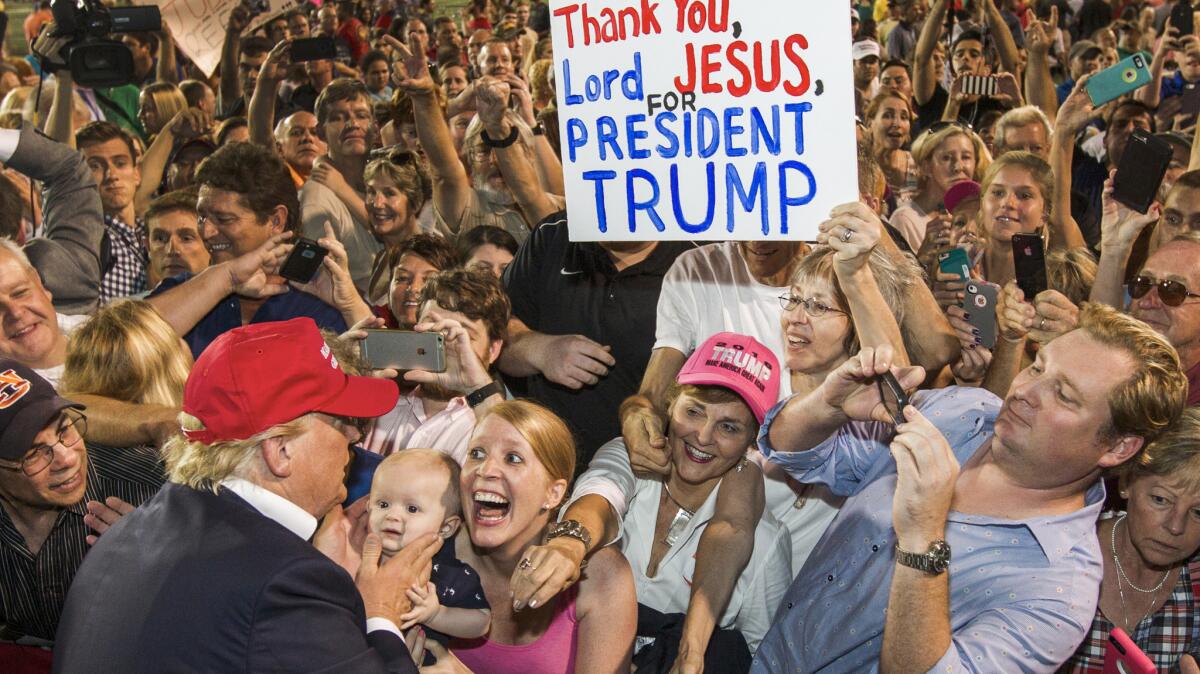Donald Trump’s presidential campaign is fueled by an anger the media didn’t see coming

In every national election cycle in recent decades there has been a segment of voters who say they are mad as hell and not going to take it anymore. But who would have predicted this year that there was enough anger out there to make real estate mogul turned reality TV star Donald Trump the presumptive 2016 Republican presidential nominee?
Not the TV news media.
There were hundreds of hours of coverage devoted to Trump interviews and speeches. His pugilistic debate performances and volatile rallies spiked ratings of cable networks and Sunday morning political roundtables, even causing some critics to suggest the media were complicit in his rise.
Full coverage: The Anger Issue »
But the story that sneaked in under sound and fury is how Trump connected to the throw-the-bums-out segment of Republican primary voters frustrated with Washington politics.
“The pundits didn’t do any better than the press,” said Larry Sabato, director of the Center for Politics at the University of Virginia. “The political scientists didn’t do any better than the press. We all missed it because it was hard at least at first to take him seriously.”
Sabato said Trump has “wildly disproportionate” appeal to non-college educated white voters who haven’s seen real wages grow since the 1990s and feel that immigration and trade polices have cut into their job opportunities. This group believes they are worse off than their parents and believe things won’t be better for their children.
It’s not a constituency that hangs out much with those who report or comment on the presidential campaigns.
“People in the media, in academe, even in entertainment don’t really have extended conversations about politics with the people who are blue collar workers.”
— Larry Sabato
“People in the media, in academe, even in entertainment don’t really have extended conversations about politics with the people who are blue collar workers,” Sabato said. “We hang out with people in our own educational category for better or worse.”
John Dickerson, political director for CBS News and moderator of “Face the Nation,” attributes the slow reaction to Trump’s flirting with presidential runs in the past only to not follow through.
As for voter anger, Dickerson said he has seen it in Pat Buchanan’s presidential campaigns in the 1990s and the tea party movement of the last decade.
But what makes Trump confounding is how his shifting policy positions and outlandish statements – such as saying Sen. John McCain was not a war hero despite his five years as a prisoner in North Vietnam – had no effect on his core supporters, despite predictions by the political pundits that his candidacy would collapse.
“What surprised me is you could say all the things that Trump could say and still survive.”
— John Dickerson
“What surprised me is you could say all the things that Trump could say and still survive,” said Dickerson. “Trump’s changes in his positions and his inconsistencies where facts are concerned may not matter. Those are small things compared to the larger truth that voters see in him.
“He wants to break down a system that has not been serving them. If you think the system isn’t serving you, you’ll be OK with radical solutions because all these other elections you’ve participated in haven’t given you what you want.”
From what he sees on social media, Sabato observes that Trump voters aren’t much interested in his opinion – or that of the traditional media either.
“When I say something, they say, I don’t believe you,” said Saboto. “They say ‘you’re part of the elites.’”
MORE:
On TV, rage has become the new romance
Anger is an energy for a new wave of women in pop culture
The complete guide to home viewing
Get Screen Gab for everything about the TV shows and streaming movies everyone’s talking about.
You may occasionally receive promotional content from the Los Angeles Times.




